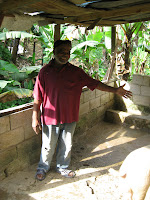
On the 22nd of December, my roommates and I were headed up into the mountains for a stay at a Bobo Rastafarian guesthouse and a hiking excursion to Blue Mountain Peak. We stopped at the post office on our way east, and I found a paper in our post office box. After a runaround typical of 3rd-world bureaucracy, I finally reached a counter where my slip would get me somewhere. A grim-faced man made me sign a ledger book and silently handed me a bag filled with books.
For months now, I have been working to start a library program in Mount Friendship’s Catholic school. The few books that they already have are weather-damaged from years of hurricanes and to get to this “library,” you have to walk through another “classroom.” Many times have I left work defeated, thinking that there was no way that this project was ever going to succeed.
But on the 22nd, feeling a bit like Santa and with a sloppy, stupid grin on my face, I carried this sack of books to the car. The tag was in my college roommate Mandee’s perfect, angular handwriting. I was unable to reach Mandee, so I called Andy, and was told that all of my college roommates had worked together to get these books to me.
During my senior year at Providence College, I lived with 10 other people in a huge tenement house at 106/108 Pinehurst Avenue—a house that we dubbed “Sparta” one night early in the year. My ten housemates, Andy, Steve, Pete, Dave, Nicole, Sarah, Mandee, Kathryn, Mike, and Claire, are all spectacular humans. They are all motivated, hardworking, problem-solving, moral, and compassionate people. Our bond went far deeper than a convenient living arrangement—as we’ve said more than once, we all just “get” each other. I could—and did—go to any of these people in times of laughter and tears.
Regardless, I was floored, and the other volunteers and I dug into the bag on the way up to the peak. Chicka-chicka boom boom! Hop on Pop! The books are in perfect condition and are colorful and beautiful.
We climbed the peak, and stopped by the post office again on the 23rd. This time, I had a package of birthday and Christmas cards from Sparta. There was also a letter from Mandee, explaining the books by saying, “This offering is the result of many people’s efforts! To name a few, we’ll start with out darling roommates!” Her letter also led me to believe that there was more than one bag coming to me.
On the 24th, I went back to the post office yet again, this time skipping my P.O. Box and going directly to the Bulk Mail room. The workers recognized me immediately and they all smiled broadly at me. “Go get your car!” They called as I approached, “More came in today, and you won’t be able to carry it all!”
Mystified, I ran back to the car and drove it around. The workers, including the grim-faced man who hadn’t said a word to me the day before, brought out bag after bag of books and loaded them into our station wagon. “Merry Christmas!” they said. I had to sign again, but this time, I got a handshake and another chorus of Merry Christmases. “Who sent these to you?” They asked me. “My friends,” I answered, fighting back tears.
Mandee’s letter explained it all, as did a phone call I placed to her later that day. Andy and Claire have been working with the Passionists for months to find the most efficient way to get the books to me. Mandee ran a book drive at the junior high where she is a Spanish and French teacher. Churches sent in donations, as did my friends from Sparta.
I am still in shock and disbelief about the project. This is the best gift that I have ever received…my friends have provided the gift of literacy to the children of Mount Friendship, and they have renewed my energy and will to complete the project. A card from Claire read, “I’ve enjoyed raising money for your library gift both because it brought us all together on a project again and because I’m imagining the look on your face when you get it.”
This gift helps me recognize the impact that Jamaica is having on my life and on the lives of others. Mandee’s letter also said, “Your decision to go to Jamaica was a good one—you’re bringing communities together in America without even knowing it.” All I can do in returns is to offer my thanks and a promise that these books will be read and reread for years to come.
So thanks, guys. Thank you for my Christmas miracle.
















